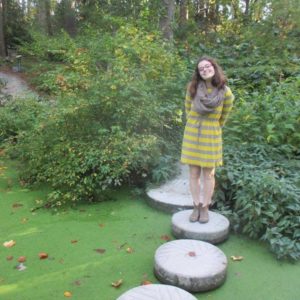 Sarah Jacoby is currently a Master of Divinity student at Duke Divinity School, where she recently finished a summer chaplaincy program at Duke Hospital. Originally from Gettysburg, Pennsylvania, she hails most recently from western New York, where her experience attending Sojourners Mennonite Fellowship in Belfast, New York brought her into the Mennonite fold. She enjoys being in the woods, long conversations over deep cups of coffee and all things peanut butter and chocolate.
Sarah Jacoby is currently a Master of Divinity student at Duke Divinity School, where she recently finished a summer chaplaincy program at Duke Hospital. Originally from Gettysburg, Pennsylvania, she hails most recently from western New York, where her experience attending Sojourners Mennonite Fellowship in Belfast, New York brought her into the Mennonite fold. She enjoys being in the woods, long conversations over deep cups of coffee and all things peanut butter and chocolate.
I knock on the partially opened door and slip my head into the room. “Hello, Ms. _________? My name is Sarah, and I’m a chaplain here at the hospital. I was hoping to stop in and see how you are doing today. Is now an okay time for me to visit?”
She invites me in, and after we exchange pleasantries she asks again who I am and why I am here. Often it takes a couple of exchanges before patients understand that I am not there to take something from them — vitals, blood samples or a signature — but that I simply came to have a conversation.
We establish an elementary knowledge of each other. Where do you come from? Who and what do you love? Why are you here? She shares about her hometown, her sisters, her Sunday school class and the antics of her border collie. We talk about the ups and downs of her hospitalization. Eventually I ask her another type of question: “How has this illness been hard for you?”
She pauses for a moment, then answers my question with a couple of thoughtful sentences. After she finishes  speaking, we settle into silence. A month ago, I would have assumed that she had said her piece and responded to it immediately, quickly moving away from the original question; today, I choose to lean into the silence and wait to see if she has more that she wants to say.
speaking, we settle into silence. A month ago, I would have assumed that she had said her piece and responded to it immediately, quickly moving away from the original question; today, I choose to lean into the silence and wait to see if she has more that she wants to say.
I am slowly learning that listening is also a verb.
I have spent the majority of my summer internship as a hospital chaplain trying to have “productive” conversations — i.e. conversations where the results are quantifiable and I can comfortably label the interaction “successful.”
Theological concept discussed: check!
Prayer offered: check!
My tendency is to think that the verbish nature of love means filling spaces with myself in some way — to contribute positively and materially to another person’s world. This summer I found myself uncomfortable with what I perceived as inaction; I was always mentally scurrying to say something constructive, to fill all the silences and to find the solutions to my patients’ fear or uncertainty. I wanted to walk into every encounter and flood it with verbs, to inundate each patient with cups of cold water and utilize my whole theological arsenal for their spiritual benefit. I wanted actions: direct, concrete, meaningful.
But I am learning that the Love that fills the world with good actions is also the love that makes space for the action of the other. Love is listening. Love is space-making.
In kabbalistic thought there is a concept called tzimtzum. This is the idea that God withdrew a portion of God’s infinite essence in order to make space for finite Creation. In the New Testament, Paul writes about the kenosis of Christ — the self-emptying nature of Christ that we are called to imitate in our interactions with one another.
Love is a verb, but it is a verb that does not insist on its own way. Love is a verb that makes room for the loved-one’s response.
Dietrich Bonhoeffer recognized this when he wrote about God as the great listener in his book, Life Together: “It is God’s love for us that He not only gives us His Word but also lends us His ear.” It has been my task this summer to learn how to listen with the ear of God; to explore the love-verbs of listening, of paying close attention, of space-making.
As the seconds pass in silence, I know that the woman in front of me may have said everything she means to say. But it is equally possible that she does not yet know that I am willing — really willing — to listen attentively to her story. So I relinquish my desire to speak grand words, I make peace with the discomfort of silence, and I let myself be taught how to listen.


